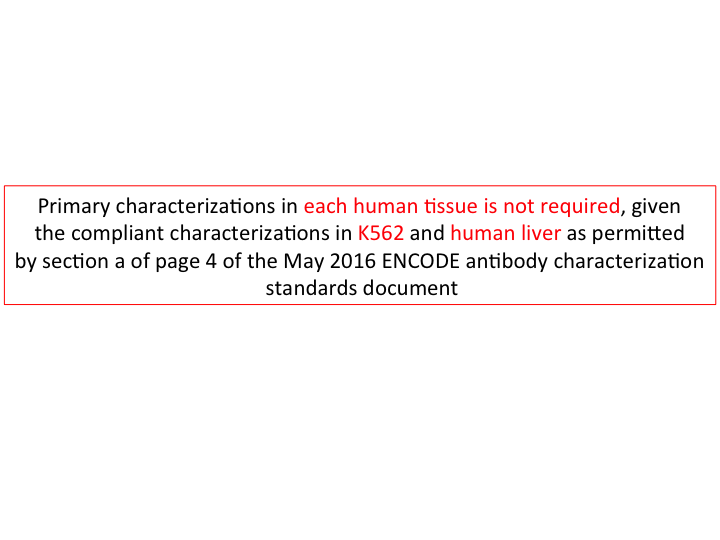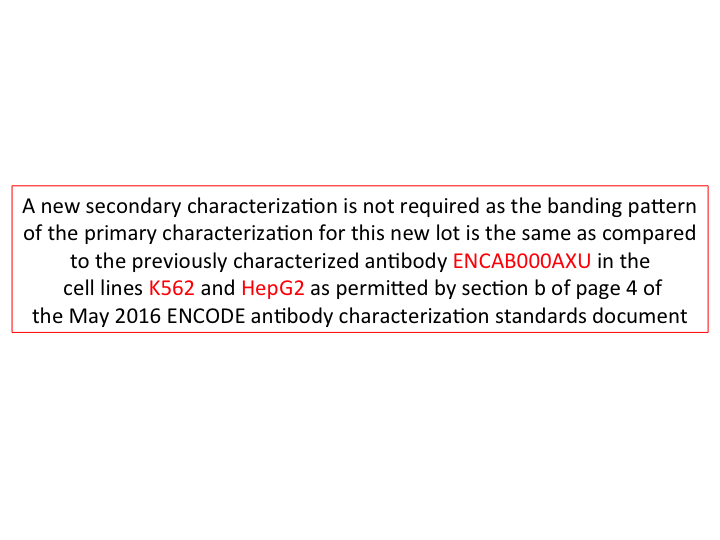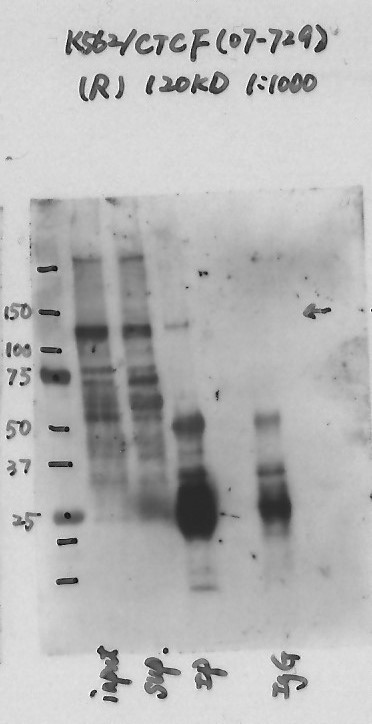ENCAB830JLB
Antibody against Homo sapiens CTCF
Homo sapiens
HepG2, K562, sigmoid colon, stomach, transverse colon, subcutaneous adipose tissue, body of pancreas, breast epithelium, suprapubic skin, spleen, gastroesophageal sphincter, omental fat pad, lower leg skin, uterus, thoracic aorta, adrenal gland, thyroid gland, gastrocnemius medialis, prostate gland, ovary, right lobe of liver, testis, tibial nerve, upper lobe of left lung, esophagus squamous epithelium, esophagus muscularis mucosa, ascending aorta, Peyer's patch, coronary artery, heart left ventricle, vagina, right atrium auricular region, tibial artery
characterized to standards with exemption
- Status
- released
- Source (vendor)
- Millipore
- Product ID
- 07-729
- Lot ID
- 2599305
- Characterized targets
- CTCF (Homo sapiens)
- Host
- rabbit
- Clonality
- polyclonal
- Isotype
- serum
- Antigen description
- KLH-conjugated, synthetic peptide corresponding to amino acids 659-675 (C-TNQPKQNQPTAIIQVED) of human CCCTC-binding factor (CTCF) with a N-terminal cysteine added for conjugation purposes.
- Aliases
- michael-snyder:AS-1647
- External resources
Characterizations
CTCF (Homo sapiens)
sigmoid colonstomachtransverse colonsubcutaneous adipose tissuebody of pancreasbreast epitheliumsuprapubic skinspleengastroesophageal sphincteromental fat padlower leg skinuterusthoracic aortaadrenal glandthyroid glandgastrocnemius medialisprostate glandovaryright lobe of livertestistibial nerveupper lobe of left lungesophagus squamous epitheliumesophagus muscularis mucosaascending aortaPeyer's patchcoronary arteryheart left ventriclevaginaright atrium auricular regiontibial artery
exempt from standards
- Caption
- Primary characterizations in each human tissue is not required, given the compliant characterizations in K562 and HepG2 as permitted by section a of page 4 of the May 2016 ENCODE antibody characterization standards document.
- Submitter comment
- The tissues from GTex are limited and cannot be spared for antibody characterizations.
- Reviewer comment
- Tissues from EN-tex can be exempted from characterization with compliant characterizations in any two cell types/tissues.
- Submitted by
- Esther Chan
- Lab
- Michael Snyder, Stanford
- Grant
- U54HG006996
- Download
- ENCAB830JLB_primary.png
CTCF (Homo sapiens)
exempt from standards
- Caption
- Primary characterizations in each human tissue is not required, given the compliant characterizations in K562 and HepG2 as permitted by section a of page 4 of the May 2016 ENCODE antibody characterization standards document. As it is also a new lot of a previously characterized antibody (ENCAB000AXU), if the banding patterns in the primary characterization of the new lot is consistent with that of the old, then a secondary characterization should not be needed.
- Submitter comment
- This is a new lot of a previously characterized antibody ENCAB000AXU, we think no further characterization is necessary beyond the primary if the banding pattern is consistent with the old.
- Reviewer comment
- Banding pattern in HepG2 and K562 is consistent with that of the primary characterizations associated with old lot ENCAB000AXU.
- Submitted by
- Esther Chan
- Lab
- Michael Snyder, Stanford
- Grant
- U54HG006996
- Download
- ENCAB830JLB_secondary.png
CTCF (Homo sapiens)
HepG2
compliant
- Caption
- Immunoprecipitation was performed on nuclear extracts from the cell line: HepG2, using the antibody 07-729. The blot shows western blot analysis of input, flowthrough, immunoprecipitate and mock immunoprecipitate using IgG.Molecular Weight: 120
- Submitted by
- Nathaniel Watson
- Lab
- Michael Snyder, Stanford
- Grant
- U54HG006996
- Download
- Expt1130_4-CTCF-07-729-HepG2.JPG
CTCF (Homo sapiens)
K562
compliant
- Caption
- Immunoprecipitation was performed on nuclear extracts from the cell line: K562, using the antibody 07-729. The blot shows western blot analysis of input, flowthrough, immunoprecipitate and mock immunoprecipitate using IgG.Molecular Weight: 120
- Submitted by
- Nathaniel Watson
- Lab
- Michael Snyder, Stanford
- Grant
- U54HG006996
- Download
- K562-CTCF.jpg


